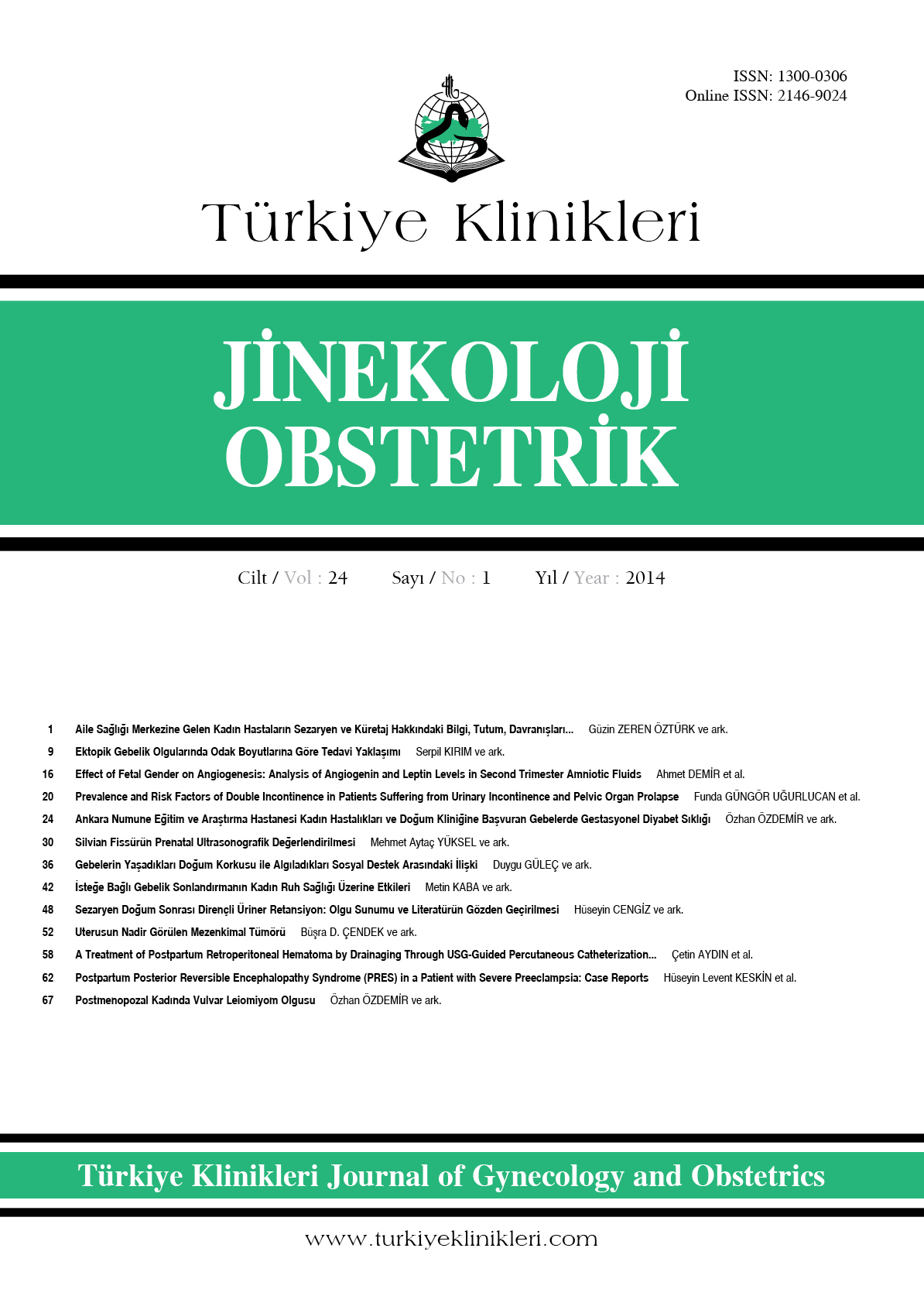Open Access
Peer Reviewed
ORIGINAL RESEARCH
5925 Viewed4018 Downloaded
The Relationship Between Fear of Birth and Perceived Social Support of Pregnant Women
Gebelerin Yaşadıkları Doğum Korkusu ile Algıladıkları Sosyal Destek Arasındaki İlişki
Turkiye Klinikleri J Gynecol Obst. 2014;24(1):36-41
Article Language: TR
Copyright Ⓒ 2025 by Türkiye Klinikleri. This is an open access article under the CC BY-NC-ND license (http://creativecommons.org/licenses/by-nc-nd/4.0/)
ÖZET
Amaç: Araştırma, gebelerin yaşadıkları doğum korkusu ile algıladıkları sosyal destek arasındaki ilişkiyi belirlemek amacı ile tanımlayıcı olarak yapılmıştır. Gereç ve Yöntemler: Araştırma, İzmir'de Ege Üniversitesi Tıp Fakültesi Hastanesi obstetri polikliniğine başvuran, herhangi bir gebelik komplikasyonu olmayan, gebeliğin 28-40. haftaları arasında olan ve araştırmaya katılmaya gönüllü 214 gebe ile yürütülmüştür. Veriler, ''Gebe Tanıtım Formu'', ''Çok Boyutlu Algılanan Sosyal Destek Ölçeği (ÇBASDÖ)' ve ''Wijma Doğum Beklentisi/Deneyimi Ölçeği (W-DEQ)'' ile toplanmıştır. Bulgular: Gebelerin yaş ortalaması 26,99±5,18 olup, %59,3'ü ilköğretim mezunu, %82,7'si herhangi bir işte çalışmamakta, %58,4'ü primipardır. Gebelerin ÇBASDÖ puan ortalamalarının 64,3±17,9 olduğu belirlenmiştir. ÇBASDÖ'nün alt gruplarının puanları incelendiğinde ise; aile desteğinin 25,0±5,3, arkadaş desteğinin 20,4±8,6 ve özel birinin desteğinin 19,0±9,2 olduğu, W-DEQ puan ortalamasının ise 46,4±31,2 olduğu bulunmuştur. Gebelerin sosyal destek puan ortalamaları ile doğum korkusu arasında negatif yönde oldukça anlamlı ilişki saptanmıştır (r=-0,385, p<0,001). Sonuç: Bu araştırma sonucunda, gebelerin sosyal destek düzeyleri arttıkça doğum korkularının azaldığı saptanmıştır. Gebelerin sosyal destek kaynaklarının arttırılması ile doğum korkusunun azaltılabileceği düşünülmektedir. Böylelikle sezaryen doğum oranları ve doğum korkusunun yol açtığı anne ve yenidoğan sağlığındaki olumsuz sonuçlar da azalmış olacaktır.
Amaç: Araştırma, gebelerin yaşadıkları doğum korkusu ile algıladıkları sosyal destek arasındaki ilişkiyi belirlemek amacı ile tanımlayıcı olarak yapılmıştır. Gereç ve Yöntemler: Araştırma, İzmir'de Ege Üniversitesi Tıp Fakültesi Hastanesi obstetri polikliniğine başvuran, herhangi bir gebelik komplikasyonu olmayan, gebeliğin 28-40. haftaları arasında olan ve araştırmaya katılmaya gönüllü 214 gebe ile yürütülmüştür. Veriler, ''Gebe Tanıtım Formu'', ''Çok Boyutlu Algılanan Sosyal Destek Ölçeği (ÇBASDÖ)' ve ''Wijma Doğum Beklentisi/Deneyimi Ölçeği (W-DEQ)'' ile toplanmıştır. Bulgular: Gebelerin yaş ortalaması 26,99±5,18 olup, %59,3'ü ilköğretim mezunu, %82,7'si herhangi bir işte çalışmamakta, %58,4'ü primipardır. Gebelerin ÇBASDÖ puan ortalamalarının 64,3±17,9 olduğu belirlenmiştir. ÇBASDÖ'nün alt gruplarının puanları incelendiğinde ise; aile desteğinin 25,0±5,3, arkadaş desteğinin 20,4±8,6 ve özel birinin desteğinin 19,0±9,2 olduğu, W-DEQ puan ortalamasının ise 46,4±31,2 olduğu bulunmuştur. Gebelerin sosyal destek puan ortalamaları ile doğum korkusu arasında negatif yönde oldukça anlamlı ilişki saptanmıştır (r=-0,385, p<0,001). Sonuç: Bu araştırma sonucunda, gebelerin sosyal destek düzeyleri arttıkça doğum korkularının azaldığı saptanmıştır. Gebelerin sosyal destek kaynaklarının arttırılması ile doğum korkusunun azaltılabileceği düşünülmektedir. Böylelikle sezaryen doğum oranları ve doğum korkusunun yol açtığı anne ve yenidoğan sağlığındaki olumsuz sonuçlar da azalmış olacaktır.
ABSTRACT
Objective: The research was conducted descriptively in order to determine the correlation between fear of birth and perceived social support by pregnant women. Material and Methods: Research was conducted with 214 pregnant women who were attending the outpatient department of obstetrics of Ege University Faculty of Medicine Hospital, without any complication of pregnancy, the weeks between 28-40 of pregnancy and who accepted to take part in the study. The data were collected using ''Pregnant Description Form'', ''Multidimensional Scale of Perceived Social Support (MSPSS)'', and ''The Wijma Delivery Expectancy/Experience Questionnaire (W-DEQ)''. Results: The pregnant women mean age was 26.99±5.18, 59.3% were primary school graduates, 82.7% were not working, 58.4% were primiparous. MSPSS mean scores of pregnant women, is determined as 64.3±17.9. MSPSS the scores of sub-groups were examined; family support was 25.0±5.3, friend support was 20.4±8.6 and support for someone special was 19.0±9.2, W-DEQ mean scores was found to be 46.4±31.2. There was a negative, fairly significant relationship between mean scores of social support and fear of childbirth (r=-0.385, p<0.001). Conclusion: It was determined that, as pregnant women''s levels of the social support increased, fear of childbirth decreased. Increasing resources of social support for pregnant women can reduce fear of childbirth. In this way cesarean birth rates and negative health outcomes in mother and newborn caused by the fear of childbirth can reduce.
Objective: The research was conducted descriptively in order to determine the correlation between fear of birth and perceived social support by pregnant women. Material and Methods: Research was conducted with 214 pregnant women who were attending the outpatient department of obstetrics of Ege University Faculty of Medicine Hospital, without any complication of pregnancy, the weeks between 28-40 of pregnancy and who accepted to take part in the study. The data were collected using ''Pregnant Description Form'', ''Multidimensional Scale of Perceived Social Support (MSPSS)'', and ''The Wijma Delivery Expectancy/Experience Questionnaire (W-DEQ)''. Results: The pregnant women mean age was 26.99±5.18, 59.3% were primary school graduates, 82.7% were not working, 58.4% were primiparous. MSPSS mean scores of pregnant women, is determined as 64.3±17.9. MSPSS the scores of sub-groups were examined; family support was 25.0±5.3, friend support was 20.4±8.6 and support for someone special was 19.0±9.2, W-DEQ mean scores was found to be 46.4±31.2. There was a negative, fairly significant relationship between mean scores of social support and fear of childbirth (r=-0.385, p<0.001). Conclusion: It was determined that, as pregnant women''s levels of the social support increased, fear of childbirth decreased. Increasing resources of social support for pregnant women can reduce fear of childbirth. In this way cesarean birth rates and negative health outcomes in mother and newborn caused by the fear of childbirth can reduce.
MENU
POPULAR ARTICLES
MOST DOWNLOADED ARTICLES





This journal is licensed under a Creative Commons Attribution-NonCommercial-NoDerivatives 4.0 International License.










